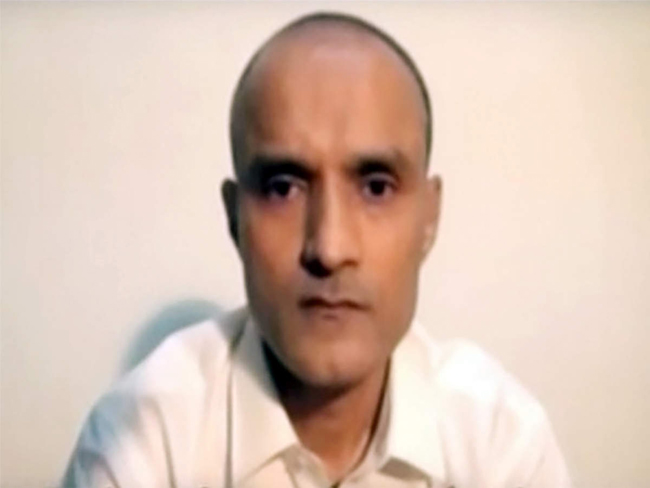Islamabad … News Time
During the hearing in the Islamabad High Court on a request to provide a lawyer to Kulbhushan Yadav, India was given another opportunity of judicial assistance to implement the decision of the International Court of Justice. A three-member bench of the apex court headed by Chief Justice Athar Minallah heard the case where Attorney General Khalid Javed Khan appeared. During the hearing, the Chief Justice remarked that the counsel for the Indian High Commission had filed a miscellaneous petition, suggesting that India had a misunderstanding regarding the proceedings of this court. He asked whether India was not ready to implement the decision of the International Court of Justice. The Attorney General told the court that India had rejected Pakistan’s proposal to appoint a lawyer for Kulbhushan and had taken the position that appearing in Pakistani courts was against its sovereignty. He said that India had approached the same court in the case of four other prisoners. In the case of Kulbhushan Yadav, India has an objection to sovereignty, so why not in the case of other prisoners.
The Chief Justice remarked that India should appoint its representative and tell this court what it wants; there is no doubt about India’s sovereignty. The Chief Justice said that India should provide so much assistance as to how to implement the decision of the International Court of Justice, there is no question of India’s sovereignty in this case. The Attorney General told the court that all the orders of this court were conveyed to Commander Kulbhushan Yadav but he has so far maintained his position that he should not approach the court. Later, the court summoned Hamid Khan to the rostrum. Hamid Khan told the court that the government of Pakistan did not need to come to the court itself to provide a lawyer to Kulbhushan. He said that the decision of the military court could be challenged and appreciated the government of Pakistan for benefiting India and Indian citizens. On this, the Attorney General said that he disagreed with Hamid Khan’s statement that the government should not have come to court. He said that if the government of Pakistan had not come to the court, then the contempt of court hearing would have been going on in the International Court of Justice. “The government has no sympathy for the killer of Pakistanis. It is not that we are running after the Indian government, but India is waiting for the hearing in this court to end,” he said. He said that India was waiting for the hearing to end and for India to approach the International Court of Justice. The Islamabad High Court later provided another opportunity for judicial assistance to India to implement the International Court of Justice’s decision and adjourned the case till June 15, seeking a response from the Indian High Commission.
Kulbhushan Yadav’s arrest and trial in international court:
It may be recalled that the present service commander of the Indian Navy, Kulbhushan Yadav alias Hussain Mubarak Patel, who worked for RAW, was arrested by Pakistani law enforcement agencies on March 3, 2016 while entering Pakistan illegally. The Indian spy had confessed before the magistrate and the court that he was given the responsibility by RAW to sabotage the peace process and ongoing efforts in the war on terror, apart from planning and liaison for terrorism in Pakistan. Clubbhushan had also said that he made several visits to Karachi in 2004 and 2005 to carry out some basic tasks for RAW, while in 2016 he entered Balochistan via Iran.
A video of Kulbhushan Yadav’s confession was also released by the Pakistan Army Public Relations Department in which he admitted that his purpose in entering Pakistan was to meet the Baloch separatists who were receiving funding. Later, in April 2017, a statement issued by the ISPR stated that a military court had sentenced Kulbhushan Yadav to death for his involvement in Pakistani espionage, sabotage operations in Karachi and Balochistan. Confirmation was later given by Army Chief General Qamar Javed Bajwa. India had on May 9, 2017 filed an appeal in the International Court of Justice against the death sentence of Kulbhushan Yadav and requested that the ICJ stop Pakistan from executing the Indian spy who was appointed for the hearing. In a petition to the International Court of Justice, India accused Pakistan of violating the Vienna Convention, saying that under the Vienna Convention, a person arrested on charges of espionage cannot be denied access. India had claimed that Kulbhushan Yadav was an innocent businessman who was tortured after being abducted from Iran and forced to confess to being a “RAW” agent, but India could not provide any evidence of his abduction. Following this, on May 18, 2018, the International Court of Justice issued an interim order suspending the execution of Kulbhushan, after which the Foreign Office informed that the Government of Pakistan had complied with the order of the ICJ.
Later, on July 17, 2019, the International Court of Justice (ICJ) handed down the final verdict in the case, according to which the death sentence handed down to Kulbhushan Yadav by a Pakistani military court was quashed and India’s request for extradition was rejected. The court in its judgment had directed Pakistan to grant consular access to Kulbhushan, on which Pakistan had granted consular access to the Indian spy. Earlier, in December 2017, Pakistan had arranged a meeting between Kulbhushan Yadav and his wife and mother. In addition, the first consular access given to Kulbhushan Yadav in September 2019 after the decision of the International Court of Justice was granted under the Vienna Convention and the decision of the International Court of Justice which lasted for 2 hours. After which, in July 2020, Pakistan had given consular access to the detained and convicted Indian intelligence agency RAW’s spy commander Kulbhushan Yadav for the second time.




